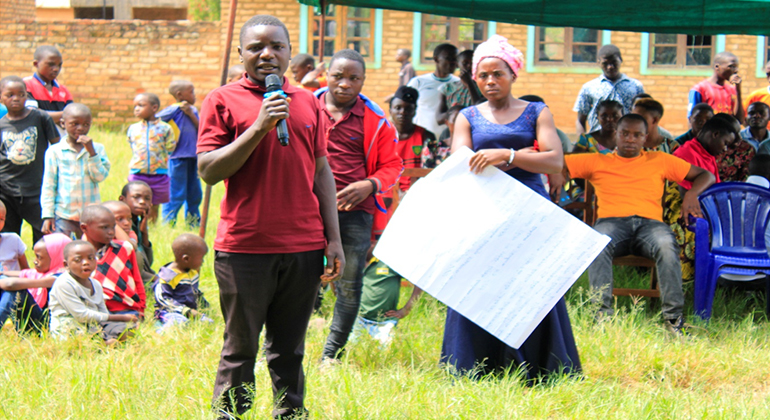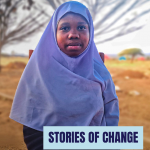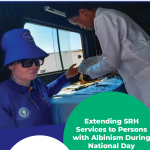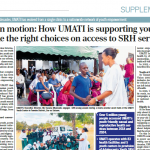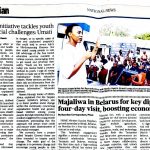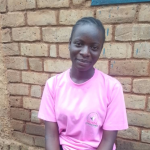Jacob Samwel Mwashambwa is young, energetic and open-minded young adult living in Hasamba Ward located in Mbozi district council in Songwe region. In June 2020, Jacob joined the Partnership for Social Accountability intervention implemented by Chama cha Uzazi Na Malezi Bora Tanzania (UMATI) to strengthen accountability in health sector in Mbozi district. This intervention aims to contribute to the equitable, effective and accountable allocation and use of public resources for health in Songwe-Mbozi district by strengthening the social accountability roles of relevant parliamentary committees, CSOs, youth groups and the media.The project builds on the basic assumption that social accountability can be achieved through purposeful individual and collective action, led by the active agency of people living in poverty, with responsive State institutions delivering on public services to ensure improved SRHR of youth and a life of dignity.
Jacob is 26 years old and married with two kids. He works as a farmer and a livestock keeper; these activities help him to take care of his family in terms of food and he sells the surplus to ensure that he is financially stable.
“Before June 2020 his life was in shambles because he was not self-aware and that he was living in the business-as-usual lifestyle like every other young male and female of Hasamba ward”.
Jacob confesses that, before hearing about this intervention he was not open minded because he was not positive about being part of the society and ill minded about progressive issues in his village and ward in particular and it seemed to him unimportant attending meetings that discussed ward development agenda. “Before hearing about UMATI, it seemed unimportant to go to village meetings where pertinent issues about the community are discussed, I was not able to do my body checkup unless am sick and I didn’t believe in using Family Planning and I did not allow my spouse to use the same”.
Jacob says, he was practically motivated by the sexual and reproductive health rights and life skills trainings conducted by UMATI in his village and decided that he was to be among the members of the established group so that he could benefit from the SRHR and life skills trainings offered through the youth group believing that they would liberate his mind. Luckily, Jacob says that the trainings have had major impact to his life making him check his health every three months regardless of being sick or not, advocates for other young adults to regularly go for checkups and encourage the youths to attend community meetings so that they can raise their issues especially in the health sector. “Through UMATI intervention, there has been a positive gesture because the youths now go to villages and ward meetings, they are being trusted by elders and have attracted representation to various committees such as health committee, environmental committee as well as Ward Council which helps them to present youth’s issues and find solutions”.
Jacob is the chairman of the youth group in Hasamba ward which has 20 members both boys and girls. This group is divided into five sub-groups with regard to the size of our ward which has about 9 streets. Members rotate in these streets offering sexual reproductive health rights education and the importance of testing for HIV/AIDS and members meet every month to discuss challenges encountered and achievements gained in the respective month.
Currently, chairmen of these streets recognize efforts made by this group and whenever they have community meetings in their streets, they invite members of the group to attend and provide SRHR information and education unlike in the previous where youths didn’t have the urge to attend to community gatherings because they lacked knowledge in the power of their opinions and had not yet been informed about SRHR. Lack of SRHR information according to Jacob, put youth at risk to contract STIs’ and STDs’ including HIV/AIDS.
From the Hasamba youths’ groups, young boys and girls are now self-aware of responsibility, accountability, informed decisions, good health and they have started to take actions that speaks volume of the transformation garnered from the SRHR education and information offered by group members of the group led by Jacob. According to Jacob “Youths are now attending community meetings, go for their health checkup regularly and also there is an increased involvement of male partners in attending clinics with their pregnant women and also there is a show of faith of youths from the community to the extent of being offered with leadership opportunities. “For instance, as we speak one of our group members is a representative of youths in the Ward Council, another member is in the environmental committee and also some of the youths out of the group are being trusted and given opportunities to represent us in other capacities as a result of the education and awareness offered by our group” Jacob.
In the Hasamba Ward, SRH youth friendly services provided at the dispensary has been improved at a significant level after the UMATI intervention and Jacob told us the reasons why he thinks there is a huge improvement. “The environment for youth’s services is conducive because there is now a special room for youths where they get to talk their issues privately with healthcare providers who is also a youth unlike before where youths received collective services with adults”. Jacob says, A good example is condom distribution, previously youths were given contraceptives such as condoms without any instructions to use but now the healthcare providers offer condoms to youths and ensure also knowledge on how to use them is given.
In Hasambwa Ward, there is availability of emergency services to youths offered at the health facility. From the youth’s group efforts, the facility is opened during holidays and weekends for youths to get friendly services and thus a youths group works closely with the healthcare providers and where need be the youths convene together and make arrangement with the facility leadership to discuss issues facing the young people of Hasambwa in terms of service delivery.

